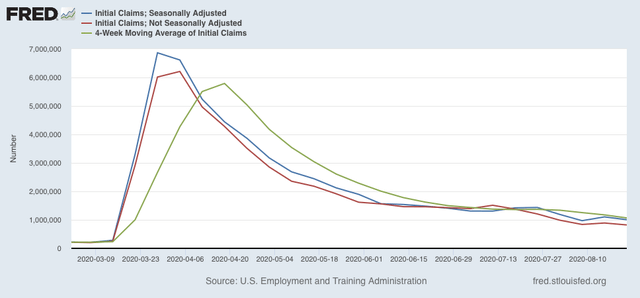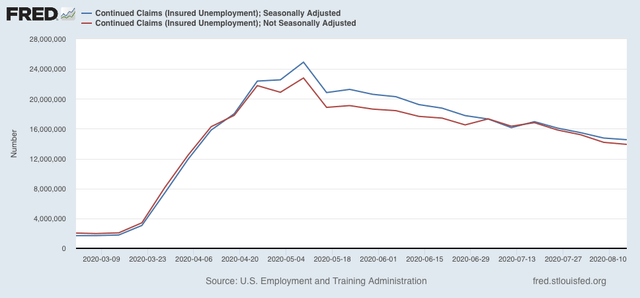Jobless claims slowly continue to get “less worse,” while longer term deadweight loss builds The good news in this morning’s jobless claims report is that the trend of “less worse” news continues. The bad news is that the improvement has slowed to a snail’s pace, at levels worse than the worst levels of the Great Recession. On a non-seasonally adjusted basis, new jobless claims declined by 68,038 to 889,549, a new pandemic low. After seasonal adjustment (which is far less important than usual at this time), claims declined by 98,000 to 1,006,000, the second-“best” level of the pandemic after 2 weeks ago. The 4 week moving average also declined to a new pandemic low of 1,068,000.: Continuing claims, on both an un-adjusted and seasonally adjusted basis
Topics:
Dan Crawford considers the following as important: Taxes/regulation, US/Global Economics
This could be interesting, too:
Joel Eissenberg writes How Tesla makes money
Angry Bear writes True pricing: effects on competition
Angry Bear writes The paradox of economic competition
Angry Bear writes USMAC Exempts Certain Items Coming out of Mexico and Canada
Jobless claims slowly continue to get “less worse,” while longer term deadweight loss builds
The good news in this morning’s jobless claims report is that the trend of “less worse” news continues. The bad news is that the improvement has slowed to a snail’s pace, at levels worse than the worst levels of the Great Recession.
On a non-seasonally adjusted basis, new jobless claims declined by 68,038 to 889,549, a new pandemic low. After seasonal adjustment (which is far less important than usual at this time), claims declined by 98,000 to 1,006,000, the second-“best” level of the pandemic after 2 weeks ago. The 4 week moving average also declined to a new pandemic low of 1,068,000.:

Continuing claims, on both an un-adjusted and seasonally adjusted basis also continued to decline to new pandemic lows, by 272,941 to 13,909,872, and by 223,000 to 14,535,000 respectively:

Continuing claims have fallen by roughly 40% from their peaks in early May.
Within the context of the pandemic recession, this counts as “good” (or continuing “less awful”) news. Nevertheless, both initial and continuing claims remain at far worse levels than even at their worst during the Great Recession.
The bigger picture is that we are almost 6 months into pandemic losses, and it is nearly certain that some temporary job and business losses have transitioned to permanent ones. In other words, even if the pandemic were to magically end tomorrow, there is a large amount of deadweight loss that is now in the system.
